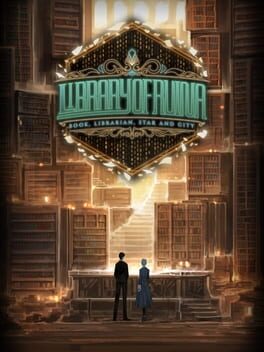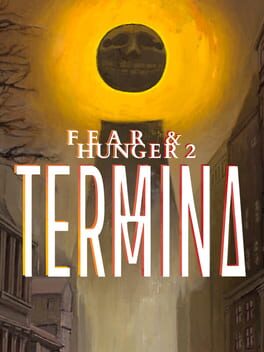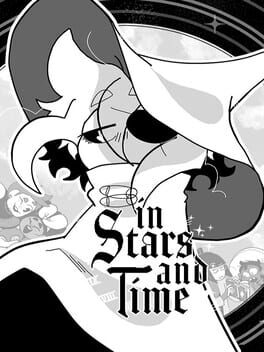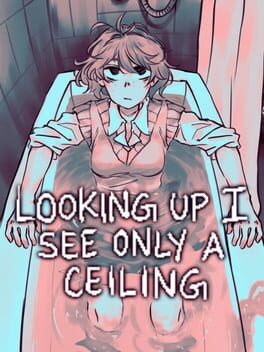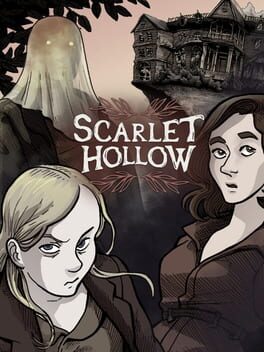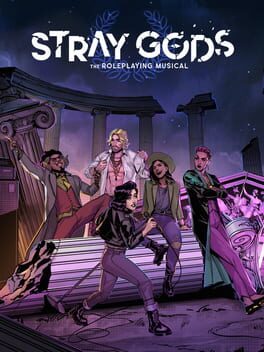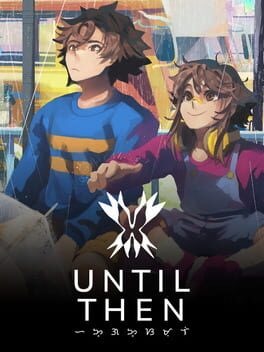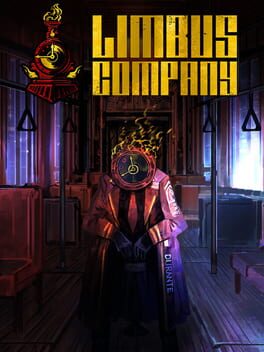sirconnie
he/him
Play more indie games!!!
I rate on vibes. 2★ means "average"/mediocre. Don't read into it too much.
I'm a huge Limbus Company fan, my friend code is M678635897. I'm also on Discord as @sirconnie! Come say hi!
Badges

Famous
Gained 100+ followers

Replay '14
Participated in the 2014 Replay Event

Listed
Created 10+ public lists

Loved
Gained 100+ total review likes

Organized
Created a list folder with 5+ lists

Trend Setter
Gained 50+ followers

Pinged
Mentioned by another user

Well Written
Gained 10+ likes on a single review

Gone Gold
Received 5+ likes on a review while featured on the front page

Donor
Liked 50+ reviews / lists

Popular
Gained 15+ followers

Liked
Gained 10+ total review likes

GOTY '23
Participated in the 2023 Game of the Year Event

1 Years of Service
Being part of the Backloggd community for 1 year

Shreked
Found the secret ogre page

Best Friends
Become mutual friends with at least 3 others

Noticed
Gained 3+ followers

Roadtrip
Voted for at least 3 features on the roadmap

Gamer
Played 250+ games

N00b
Played 100+ games

GOTY '22
Participated in the 2022 Game of the Year Event
Favorite Games
400
Total Games Played
055
Played in 2024
052
Games Backloggd
Recently Played See More
Recently Reviewed See More
This review contains spoilers
To me, what defines a compelling choice is sacrifice. This could mean a character disliking you, an item being destroyed, having to spend limited resources, or a character's death. Not every choice can demand you give something up, though, nor should it. Sometimes, a choice is between two story routes, two pieces of loot, or recruiting one of two characters. But what complicates these choices is that the options are mutually exclusive. You're strictly better off than before no matter what you choose, but you're making the decision to take one option and leave the other behind.
If to choose is to sacrifice, then to have freedom is to gain. To gain loot, EXP, quests, and allies without being held back. To do whatever you want.
Therein lies the contradiction. To make an interesting choice you need to be willing to give something up, but to be free you need to have access to whatever you want.
Baldur's Gate 3 wants you to have your cake and eat it too, and then gives you even more cake to top it off. It's a virtual dollhouse. No matter what you do, you can't be asked to sacrifice anything, because that would compromise player freedom, which is valued above all else.
Minthara, to me, represents BG3's refusal to demand sacrifice. In Act 1 you're asked to choose: protect a grove of druids full of tiefling refugees from goblin cultists, or side with the cult and slaughter everyone in the grove. In theory, Minthara is your reward for siding with the cult. The grove has much more going for it; you get three companions (Wyll, Karlach, and Halsin), and the tieflings appear again in later acts with sidequests and excellent loot. Even worse, siding with the cult has no benefits in making allegiances, since you infiltrate them in Act 2 either way and they turn on you either way. But at least you get Minthara as a companion. She doesn't have a questline or anything like everyone else does. But at least it's something.
Except, wait, Larian patched in a way to recruit Minthara while siding with the grove. You just need to attack her non-lethally while raiding the cultists. You can then recruit her in Act 2. There is almost no roleplay reason you would spare Minthara and only Minthara. This is entirely a metagame trick. But it doesn't have to make sense, because the fans want to gain Minthara without sacrificing the grove.
BG3 has the issue in general with "good" and "evil" choices. When you're good you're showered in praise, loot, and EXP. When you're evil you skip plotlines with no alternatives.
Okay, fine, you do, technically, have the ability to make choices in BG3. It's just that your choices are always between a reward and nothing, or a penalty and nothing. There's always a "correct" choice, where you win every reward there is to win and avoid every penalty there is to avoid. Rarely are choices mutually exclusive. Often your choice is to complete a sidequest or skip it. The worst unavoidable penalty you can ever receive is companion disapproval, which is completely binary and is easy to max out on everyone other than Astarion and Minthara by being a goody two-shoes hero.
As much as I hate to admit it, on my good-aligned playthrough, I sided with the grove and recruited Minthara. I'm not here to condescend because I care about the sanctity of choice or whatever. We've all heard "Given the opportunity, players will optimize the fun out of a game," and I'm no different. Why would I be? Recruiting Minthara is a reward or nothing choice. I lose nothing by recruiting her.
Even worse, sometimes "optimizing the fun out of the game" really does feel intended. In Act 2, I was tasked with freeing Mizora from a mind flayer pod. I'm a filthy minmaxer and had my character's intelligence at 8. I was given the "choice" of two levers to free her, but because I was dumb as rocks, I failed two intelligence checks to read the labels. I picked one at random. Unfortunately, I picked wrong, because Mizora and Wyll both immediately died, Wyll's soul condemned to the Hells. So of course I reloaded, picked the right lever, and saved Mizora. She even gave me a cool sword because Wyll was in my party. So my "choices" here were "kill Wyll irreversibly with no benefit" or "get a cool sword and Wyll survives." Even worse, I was forced to make that choice completely blind because I failed two rolls that would help inform my choice. Or, to eliminate the randomness, I could metagame by either save-scumming, or switching party members until I pass the check to read one of the labels. But then I'm being actively rewarded for optimizing the fun out of the game. I can see no reason why I would want to let Wyll die here.
And oh, the dice rolls. There's always a "correct" choice, but sometimes you're locked out of that choice because you happened to roll a 1, guaranteeing failure. You can entirely miss Gale, a companion with his own questline, because you got a critical failure when saving him right at the start of the game. Gale's absence offers no alternative storylines. Saving Gale is reward or nothing, entirely at the mercy of the dice. Yes, rerolling with inspiration mitigates this, but my point stands.
I don't know where else to add this, but I want to add that it frustrates me how often your choices boil down to "persuade" or "kill." People attack you for the most minor of disagreements and are ready to throw their lives away or become murderers with no way to de-escalate other than to run away. It makes everything feel very gamified, like Larian felt it a waste to not use the game's combat system as often as possible.
My impression of the game is that its replayability comes not from its vast network of choices, but from its sheer volume of content. You're likely to miss certain quests or areas without a guide, and if you make the "incorrect" choice you cut off future content. To me, that isn't compelling, and doesn't warrant another playthrough.
Despite all my previous criticism, I did genuinely have fun with the game. Exploration and theorycrafting are two things I love in general, and Baldur's Gate 3 kept me satisfied in those two aspects for over a hundred hours before I burnt out. But when I see such lofty praise for this game, I realize high-budget games will always be beholden to fan expectations and demands for player freedom over interesting limitations. I'm worried this will be the golden standard for choice in video games going forwards, and I can't help but feel a little bitter.
After 100+ hours into Baldur's Gate 3, I didn't understand the appeal of roleplaying in a video game. I had an idea of who I wanted my character to be - Val, an empathic Ilmater Cleric/Oath of the Ancients Paladin multiclassed Half-Orc. But as the game went on, all the way up until I shelved it in Act 3, I never felt like I was playing a character so much as an archetype. I wasn't Val, I was Neutral Good Cleric/Paladin. I picked the cleric and paladin dialogue when it wasn't too preachy and the singular "nice" dialogue otherwise.
Beyond my dialogue options, I never made roleplay choices through gameplay either. I resolved every quest I was given, lockpicked every chest and door, killed every useless NPC that vaguely aligned with "evil." My companions weren't gonna scrutinize me, so I might as well get that sweet loot and EXP. As soon as I'm shown tangible rewards, my incentive to roleplay flies out the window. Who cares what I pretend is true about my character in my head if nobody in the game acknowledges it? I might as well just make an OC outside the limitations of the game and write a fanfic.
All that to say that Scarlet Hollow is the first time I've understood what it means to roleplay in a video game.
In the first chapter of the game, my new friend Stella asks about my life in the city. I decide that I live with my ex-roommate's cat, Truck. Later, all the way in the fourth chapter, I offer to let a new friend move in with me back in the city, but warn him my cat Truck is a bit of an asshole. I then immediately decide to watch a horror movie to kill time, and he's confused, because I told him I hate horror movies in chapter 3.
Scarlet Hollow does that a lot. The game warns you at the beginning, when choosing how to respond to a stranger handing you a bag of boiled peanuts, that this (and future choices) will not only shape future events, but who you are as a character and how others perceive you. And it isn't lying. There's no illusion of choice here. The game really is paying attention to these small details about who you are. You aren't incentivized to roleplay by playing pretend in your imagination; you're given explicit feedback that the game knows what you've chosen to do.
When starting, I had the vague idea that I'd be nice to everyone. But Scarlet Hollow cares about you as the protagonist as much as it cares about its own characters. Through interacting with Stella, I became an English major living with my ex-roommate's cat. I'm a skeptic about the supernatural, but after our run-in in the woods, I'm coming around. The game is building my character alongside me; it wants you to roleplay and plays a role in shaping this character together with you.
Beyond compelling roleplay, Scarlet Hollow adds more layers to choice. In most scenes, there are dialogue options marked (Explore) which allow you to ask questions and scope out the situation without changing the topic. This ensures you always understand when what you say progresses a conversation.
What's more, sometimes something will happen that progresses the scene outside your control and interrupts you from using every (Explore) option. Talking isn't a free action. Time moves outside your actions. Even though this is a rare occurence, it adds to the weight of what you choose to say and makes choosing not to say anything an option worth considering.
Sometimes, (Explore) options are mutually exclusive - in chapter 1, you can (Explore) to compliment or insult the estate to your cousin Tabitha while she gives you a house tour, but you can't do both.
Other times, (Explore) options feel better unsaid. I could warn everyone in town to run from whatever monsters are lurking in the woods, but I don't want the whole town's first impression of me to be that I'm crazy. I could joke with Tabitha about our dead moms, but I don't think she'd find it funny. I could ask invasive questions to an overbearing mother about her chronically ill son, but it was hard enough getting her to agree to invite us for dinner.
One moment that sticks out to me as indicative of my investment in roleplaying was in chapter 2. I snuck in somewhere I wasn't supposed to be and started interrogating people about recent events. When I reached my third group of interviewees, my new friends emphasized that I was in a bad position and had to be ready to make a getaway. I asked the single question I was most interested in out of 3 with the (Explore) tag before running off. I made a smooth escape. Would I have been caught if I took too long and asked the other two questions? Who knows! But the fact that I might have been caught made my roleplaying choice to cut the conversation short, to ask the biggest question on my mind and make a run for it, feel meaningful. When Scarlet Hollow tells me to be careful, I believe it and heed its warning. In any other game, I would pick the tangible choice of reading all optional dialogue.
Even the more insignificant dialogue choices feel impactful. There's almost never just a "nice" and "mean" option; you can be polite, awkward, playful, abrasive, quiet, nosy... I can't imagine most of these choices are tracked, but I'm always thinking how I want to respond and what tone makes sense for my character, as well as how to interact with everyone. Stella is sociable and outgoing, so I can joke around with her. Tabitha is mistrusting and reserved, so I have to show her I'm willing to bury the hatchet while giving her space to reciprocate.
And I haven't even mentioned the trait system yet! At the start of your playthrough you can pick any 2 of 7 traits. These give you new options in dialogue, and sometimes cause you to notice things you otherwise wouldn't. And rarely, there are special choices and checks that require two specific traits, meaning the game accounts for 21 different possibilities. There's just so much going on, so many avenues for player expression, and it's a miracle how it's tied together so cohesively.
And I was rewarded with such a great moment at the end of chapter 3 for all the thought I had put into my character and his relationships. I'll leave this vague, because this game is good and you should play it for yourself! But I was so emotional at what happened, at seeing the achievement completion being 16% on Steam and knowing this was the specific result of the choices I made and the relationships I built.
Playing the four currently available chapters gave me a total playtime of 7 hours. According to the devs, the game in its current state already has 580,000 words, which Google says would take 32 hours to read. That means one playthrough put me at less than ~1/4 of the text there is to read. The dedication and care that went into this is incredible.
Of course, Scarlet Hollow isn't truly limitless in possibility. There's a story it wants to tell and it will railroad you sometimes. There are other characters with their own agency. They aren't bending over backwards to do whatever you want. And it's all the better for it. The balance between the story it wants to tell and your ability to inject your own character into the narrative is amazing.
I know this is an unreasonable ask for bigger games. Black Tabby Games have had massive delays for the upcoming chapters because the ballooning scope of choices causes so many new dialogues and even routes to open up. Slay The Princess was a smaller project (which I also adore) meant to raise funds so they could keep working on Scarlet Hollow. I can only imagine how many millions (billions?) of words you'd need for something as long as Baldur's Gate 3, and it would make voice acting unviable. And even for indie devs, who can get away with smaller scopes, this kind of script is really demanding and time-consuming. Which makes it all the more miraculous this thing exists, even in its early-access state.
Video games are static. Once a dialogue tree has been written out, the possibilities are limited. Without a human to interpret your actions, a game can't respond to every possible thing you might want to do. But by clearly stating your options and constantly responding to what you choose, no matter how seemingly minor, Scarlet Hollow feels so massive in scope despite its short playtime. The "illusion of choice" is often a necessary evil to keep development scope reasonable. But it's so refreshing to see, just once, the potential of choice realized.
Please support these developers and the great work they've put in across both Scarlet Hollow and Slay The Princess. If you like one, you'll love the other.
Love must be the reason why
I still believe in this lie
That you'll live a better life
Without me by your side


